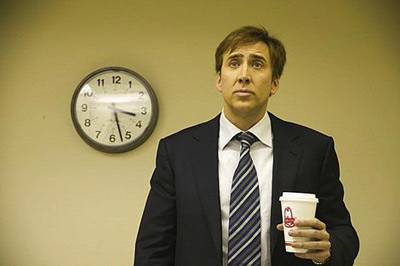中年危机 Midlife crisis

Midlife crisis is a term coined in 1965 by Elliott Jaques and used in Western societies to describe a period of dramatic self-doubt that is felt by some individuals in the "middle years" or middle age of life, as a result of sensing the passing of their own youth and the imminence of their old age. Sometimes, a crisis can be triggered by transitions experienced in these years, such as extramarital affairs, andropause(男性更年期) or menopause(绝经期), the death of parents or other causes of grief, unemployment or underemployment, realizing that a job or career is hated but not knowing how else to earn an equivalent living, or children leaving home. The result may be a desire to make significant changes in core aspects of day-to-day life or situation, such as in career, work-life balance, marriage, romantic relationships, big-ticket expenditures, or physical appearance.
Academic research since the 1980s rejects the notion of midlife crisis as a phase that most adults go through. In one study, fewer than 10% of people in the United States had psychological crises due to their age or ageing. Personality type and a history of psychological crisis are believed to predispose some people to this "traditional" midlife crisis. People going through this suffer a variety of symptoms and exhibit a disparate range of behaviors.
Many middle aged adults experience major life events that can cause a period of psychological stress or depression, such as the death of a loved one, or a career setback. However, those events could have happened earlier or later in life, making them a "crisis," but not necessarily a midlife one. In the same study, 15% of middle-aged adults experienced this type of midlife turmoil.
Some studies indicate that some cultures may be more sensitive to this phenomenon than others, one study found that there is little evidence that people undergo midlife crises in Japanese and Indian cultures, raising the question of whether a midlife crises is mainly a cultural construct. The authors hypothesized that the "culture of youth" in Western societies accounts for the popularity of the midlife crisis concept there.
Researchers have found that midlife is often a time for reflection and reassessment, but this is not always accompanied by the psychological upheaval popularly associated with "midlife crisis."
For the approximately 10% of middle aged adults who go through an age-related midlife crisis, the condition is most common ranging from the ages of 30-60 (a large study in the 1990s found that the average age at onset of a self-described midlife crisis was 46). Midlife crises last about 3–10 years in men and 2–5 years in women.
A midlife crisis could be caused by aging itself, or aging in combination with changes, problems, or regrets over:
* work or career
* spousal relationships
* maturation of children
* aging or death of parents
* physical changes associated with aging
Midlife crises seem to affect men and women differently. Researchers have proposed that the triggers for mid-life crisis differ between men and women, with male mid-life crisis more likely to be caused by work issues.
Some have hypothesized that another cause of the male mid-life crisis is the imminent menopause of the female partner and end of her reproductive career.
Individuals experiencing a mid-life crisis have some of these feelings:
* search of an undefined dream or goal
* a deep sense of remorse for goals not accomplished
* desire to achieve a feeling of youthfulness
* need to spend more time alone or with certain peers
They exhibit some of these behaviors:
* abuse of alcohol
* acquisition of unusual or expensive items such as motorbikes, boats, clothing, sports cars, jewelry, gadgets, tattoos, piercings, etc.
* depression
* blaming themselves for their failures.
* paying special attention to physical appearance such as covering baldness, wearing "younger" designer clothes etc.
* entering relationships with younger people (either/or sexual, professional, parental, etc.)
* placing overimportance (and possibly a psychologically damaging amount) on their children to excel in areas such as sports, arts or academics.
考考你
1. 你应当遵守诺言。
2. 咱们现在歇一会儿吧。
3. 有些人总是为一些鸡毛蒜皮的事而不停地发牢骚。
4. 警察拦住人群。
5. 乔治年轻有为,是个不可多得的人才。
《重回17岁》精讲之一 参考答案
1. The crowd waited patiently while the teams warmed up.
2. The party warmed up when she came.
3. Hang on a minute while I look it up.
4. Hang on at your present job until you can get another.
(中国日报网英语点津:陈丹妮)
点击查看更多精彩电影回顾